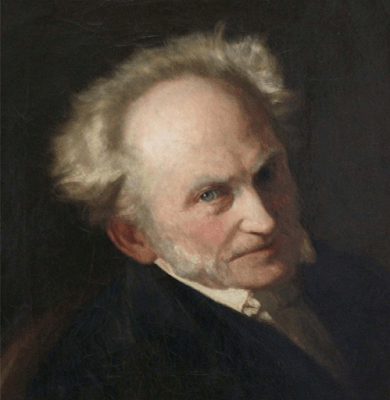Let me say something about Schopenhauer, a philosopher who, moreover, was greatly appreciated by the religious who saw in him a “judger of creation”, a moralist who knew how to distinguish between good and evil, who knew the meaning of reaching a goal: “.. if one running all day, arriving in the evening, he can be said to be satisfied. Well, now I’ve done it, the twilight of my life becomes the dawn of my fame” (Senilia page 84 of the original manuscript of 1856).
He called himself in his memoirs a “despiser of men” one who despised human stupidity while appreciating his personal intelligence.
This separative intellectual pride is certainly not very “secular” and in fact its “art of knowing oneself” is entirely directed to the knowledge of the “person” as an entity detached from the context, an individuality “chosen”, evidently by God. And this attitude was very pleasing to the doctors of the church who -they too- feel “blessed” and privileged and protected for their faith in God (moreover blind).
But from the point of view of absolute reality both the person and the creation can manifest themselves “progressively” only in the context of duration, being the concept of purely figurative space-time existence, that is, it has no real substance being a configuration of constructed and projected events in the mind.
Therefore in the vision of the absolute Existence-Consciousness the person and the creation “appear” simultaneously to the observer (the Self) revealing themselves in the apparent development of the passage of time in space. The manifestation is in fact a simple reflection in the mind of the perceiver who manages to capture and process it by “stopping” the frame, step by step in consciousness.
That single frame (person and creation) is actually a momentary form, within the total manifestation, which -although always present in its absolute entirety- is illuminated by the individual consciousness, seen with the eye in the mind and unrolled in the context called the “process of becoming”.
From this it can be deduced that the description of a person and his hypothetical results is as relative and illusory as the “creationist” vision (as an emanation of a separate god). With all due respect to the philosopher Schopenhauer and all the priests who admire him.
Paul D’Arpini
english text
Let me say something about Schopenhauer, a philosopher who, moreover, was greatly appreciated by the religious who saw in him a “judger of creation”, a moralist who knew how to distinguish between good and evil, who knew the meaning of reaching a goal : “.. if one running all day, arriving in the evening, he can be said to be satisfied. Well, now I’ve done it, the twilight of my life becomes the dawn of my fame” (Senilia page 84 of the original manuscript of 1856).
He described himself in his memoirs as a “despiser of men” one who despised human stupidity while appreciating his personal intelligence.
This separative intellectual pride is certainly not very “lay” and in fact its “art of knowing oneself” is entirely aimed at the knowledge of the “person” as an entity detached from the context, an individuality “chosen”, evidently by God. And this attitude was very pleasing to the doctors of the church who – they too – feel “blessed” and privileged and protected for their faith in God (moreover blind).
But from the point of view of absolute reality both the person and the creation can manifest themselves “progressively” only in the context of duration, being the concept of purely figurative space-time existence, that is, it has no real substance being a configuration of constructed and projected events in the mind.
Therefore in the vision of the absolute Existence-Consciousness the person and the creation “appear” simultaneously to the observer (the Self) revealing themselves in the apparent unfolding of the passage of time in space. The manifestation is in fact a simple reflection in the mind of the perceiver who manages to capture and process it by “stopping” the frame, step by step in consciousness.
That single frame (person and creation) is actually a momentary form, within the total manifestation, which -although always present in its absolute entirety- is illuminated by the individual consciousness, seen with the eye in the mind and unrolled in the context called the “process of becoming”.
From this it can be deduced that the description of a person and his hypothetical results is as relative and illusory as the “creationist” vision (as an emanation of a separate god). With all due respect to the philosopher Schopenhauer and all the priests who admire him.
Paul D’Arpini

